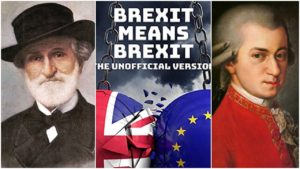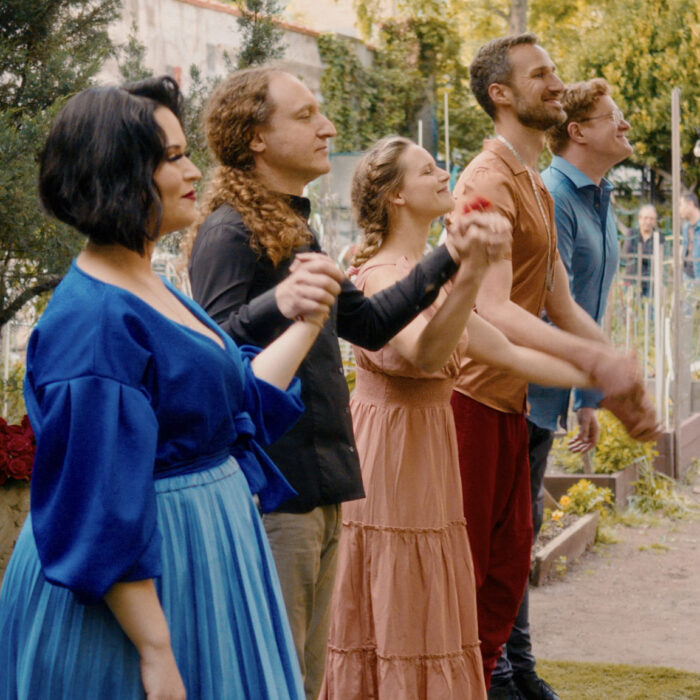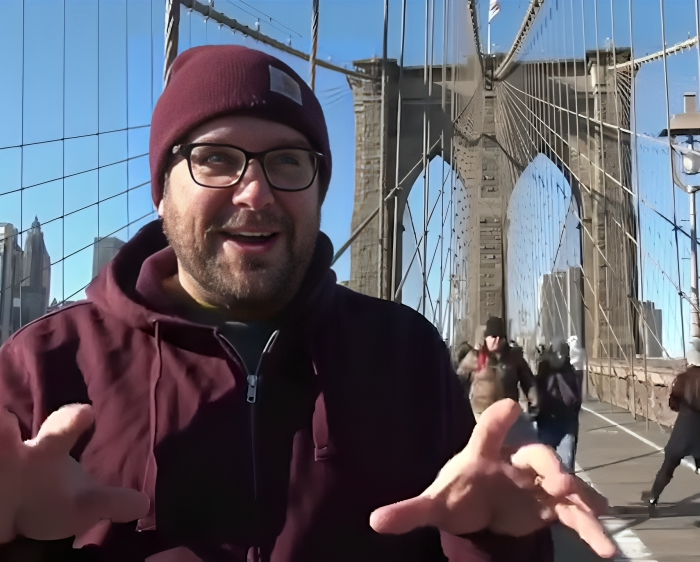
Opera Meets Film: How Operatic Arias Develop Political Themes in Patrick Forbes’ Documentary ‘Brexit Means Brexit’
By Mahima Macchione“Opera Meets Film” is a feature dedicated to exploring the way that opera has been employed in cinema. We will select a section or a film in its entirety, highlighting the impact that utilizing the operatic form or sections from an opera can alter our perception of a film that we are viewing. This week’s installment features Patrick Forbes’ “Brexit Means Brexit.”
Patrick Forbes’ “Brexit Means Brexit: The Unofficial Version” isn’t just an excellent documentary, it’s a masterpiece in the use of music to add both verve and nuance to the film medium. The hour-long work makes extraordinary use of nearly 30 operatic arias as Forbes comments on British political life and the curious turn of events that followed the 2016 Brexit referendum.
The film opens with a bang, with Charles Gounod’s electrifying “Je veux vivre” from “Romeo and Juliet,” setting the scene for what UK politics felt like in the wake of the 2016 vote. The thrilling crescendo underscores the political drama, as passions ran ever so high.
To this joyful tune we are introduced to the main characters of the drama: soon-to-be-Prime-Minister Theresa May, lead hardline Brexiteer Nigel Farage, rambling Conservative Boris Johnson, the newly elected American President Donald Trump and others – including Downing Street’s most dutiful member, Larry the cat. The masterful use of the musical opening sets the mood for the documentary, and the multitude of operatic excerpts elaborate on it like variations on a theme, subtly developing the narrative and crafting the film’s heightened aesthetic.
Linking the Brexit vote to the 2016 American presidential election, Forbes appeals to a primal idea of masculinity by superimposing the top notes of one of the most famous tenor arias ever written – Verdi’s “Di quella pira” from “Il Trovatore” – onto the scene where a newly elected Donald Trump (with characteristic thumbs up) poses alongside buddy Nigel Farage, all aptly framed by a glittering golden door in the palatial Trump Tower. The spectator is confronted with this stark new reality set against an absolutely stonking Verdi aria.
In what follows, Forbes cleverly makes use of the Bridal Chorus from Wagner’s “Lohengrin” when raising the “special relationship” with America. A few moments later, where the narrator tells of Donald Trump’s election victory and Nigel Farage’s supposed “appointment” as British Ambassador to the United States, we hear “The Marriage of Figaro’s” famous aria “Se Vuol Ballare.”
Here, Figaro sings alone onstage, provocatively addressing his employer Count Almaviva, with the message: “Play games with me and you’ll be outwitted. You, dear little Count (note the diminutive form, “Contino”), may feel like dancing, but I’ll be the one calling the tune. With cunning, stealth and craft I’ll be the one calling the shots.”
Figaro’s mockingly fun aria is a belligerent call for a battle of wits – an effective musical choice to comment on the supposed new power structures depicted on screen. A musical icon of 18th-century class conflict translates beautifully to 21st-century populist satire.
He then overlays the scenes portraying Donald Trump’s presidential inauguration with “The Barber of Seville’s” “Largo al Factotum.” In the opera, it’s an aria sung when the main character Figaro firsts appears on stage, marking his pompous “grand entrance.”
The Royal Opera House explains: “In this most famous of baritone numbers, Figaro introduces himself as the sharpest character in town… Usually, we hear him before we see him because his opening cavatina tends to start offstage, its bustling self-importance trumpeting through the streets of Seville… He is, as he says, the town factotum before whom all must step back (Largo al factotum).”
In similar vein, the moment when the UK begins its withdrawal from the European Union, triggering article 50 on 29th of March 2017, the spectator sees a resolute Theresa May – then Prime Minister – to the sound of Leoncavallo’s “Vesti La Giubba” from “Pagliacci,” the excruciating aria sung by a character in agony because he knows he has been betrayed.
Although these references might not be obvious to anyone unfamiliar with the operas, the music alone is often enough to add meaning through its tempo, modality, timbre and dynamics. Just as Steven Spielberg’s “Jaws (1975)” couldn’t exist without its musical motif – those two unmistakable notes are enough to conjure up primal fear – opera in “Brexit Means Brexit” plays a defining role in conveying the passions around the political events portrayed. In this case, the film calls for a type of musical treatment which arguably can only be satisfied by the idiosyncrasies of this particular musical genre: only the high drama of opera and the place it occupies in the collective imagination can adequately reflect both the highest levels of government and the heightened emotions surrounding the events of that time.
The aim of the documentary is to chronicle and report, but it would not have been so successful without the right musical background. Forbes’s playful use of the apparatus of opera – both the music itself and the visual structure of the documentary built around an overture and three acts – prompts the idea of an allegorical, self-referential opera, one which parodies itself: a real tragicomedy, played to great political effect.
Check out the documentary below.
Categories
Opera Meets Film

